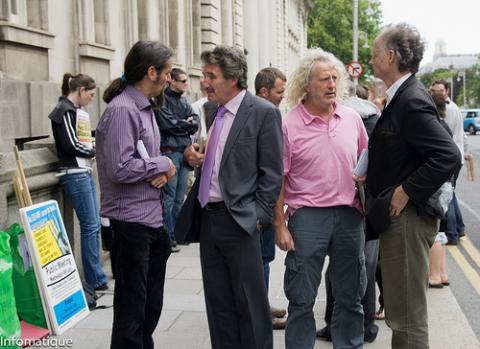Dáil to introduce new rules on acceptable dress

The Dáil Committee on Procedures and Privileges has taken a decision to introduce a new dress code for TDs, to be implemented when the Dáil reconvenes after the summer recess. Full details are not yet available but it has been suggested the dress code will require TDs and Senators to wear “business attire” – for men this means wearing a suit or jacket and trousers with a long sleeve shirt; for women it is as yet unclear what the parameters of business attire are, though the Belfast Telegraph reports that it extends only to a ban on wearing jeans.
Richard Boyd Barrett, Independent TD for Dún Laoghaire, described the new rules as “pathetic” and “further evidence that we have a Government of clowns.
"The country is drowning in debt, we have half a million people unemployed, we have people facing the loss of their homes and cuts to the most vulnerable, and these clowns are wondering what people wear in the Dail. It's pathetic.”
Speaking on RTÉ’s News at One, Independent TD for Wexford Mick Wallace described the move as “a bit ridiculous” and said that the Ceann Comhairle, who has expressed the view that standards in the Dáil need to be upheld through the implementation of a stricter dress code, is “living in the dark ages”.
He went on: “The people of Wexford elected me, and I didn’t wear a pinstripe suit while I was out canvassing.
When I was out campaigning [before the election] I found that a lot of people felt a huge disconnect between people and the Oireachtas.
The notion that [TDs who support the dress code] find dressing like ordinary people so upsetting shows that they live in a different world…They live in a bubble.”
Earlier this year, Luke 'Ming' Flanagan told the Dáil:
"What does it matter about how one looks, how big or small one is, how long or short one's hair follicles or what type of clothing one wears? That is irrelevant. It is a rotten message to send out from the Chamber.
"If abuse is constantly thrown at Members because of the way they look, that will send a signal to young people that if they do not look the same as everyone else then there is something wrong with them when there is not."
Similar arguments over dress codes have occurred in parliaments around the world. In January this year two members of Germany’s Bundestag were chastised for not wearing ties while in Sweden Minister for the Environment Andreas Calgren was the subject of some criticism earlier this year when he addressed parliament while wearing a leather jacket.
In recent months, arguments over the requirement to wear ‘colonial’ suits and ties in the Kenyan parliament, which took off in 2003 when three Kenyan MPs were expelled for wearing traditional African dress, were reignited when MP Gidion Mbuvi was thrown out for wearing sunglasses and ear studs. Defending his choice of attire, Mbuvi said: “"I represent the youths who elected me to parliament. I'm trying to prove to the world that it is the right time for the youth to be in charge of our nation." Another MP also defended Mbuvi, saying: "Men in majority of the African communities traditionally used to wear studs. The trend had disappeared but is now making a comeback and should not be condemned."
At the time of the 2003 controversy in Kenya, one of the expelled MPs, Koigi wa Wamwere, told the BBC: “This argument that the only dress that can be decent is European dress is to me awfully colonial. And I am not sure that even Europeans would today dare advance such an argument."
Speaking to the Irish Times today, Independent TD for North Kildare Catherine Murphy said: “There was a very strict dress code in Anglo Irish Bank. Dress codes don’t necessarily mean people do things with the right motivation.”
Image top: infomatique.
